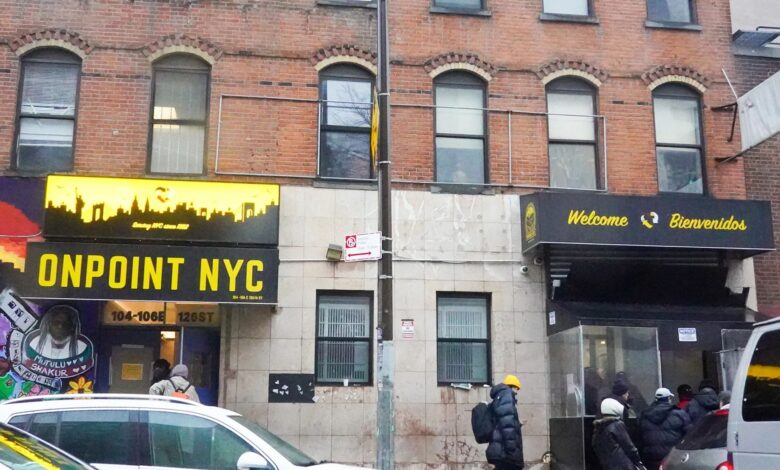Inject some common sense — shut down NYC’s ‘safe’ drug sites

In November, Donald Trump made significant electoral gains in New York’s black and Latino neighborhoods, and in the city’s least affluent communities. Now he is poised to take an important step to improve public safety in these voters’ neighborhoods.
Rep. Nicole Malliotakis (R-SI) last week wrote to new Attorney General Pam Bondi, pleading for the administration to shut down the city’s two “safe injection sites.”
These facilities, located in East Harlem and Washington Heights, provide supervision to drug abusers as they consume harmful substances like fentanyl, meth, heroin and cocaine.
Yes, these are illegal drugs under federal law — and the aptly nicknamed federal “crack house statute” prevents individuals from retaining property for their consumption.
Indeed, Trump’s Justice Department successfully shuttered similar sites in the past.
In 2019, his first administration sued to stop a Philadelphia injection center from opening, and in 2024 a US District Court judge in Pennsylvania finally agreed that the center was not exempt from federal drug laws.
It was a massive relief to the surrounding Philly neighborhood, which was outraged by the sneaky lack of transparency around plans that would attract drug dealers into their community.
Now Trump should listen to his NYC minority constituents and close the injection sites that are harming their neighborhoods.
New York’s two centers, both run by non-profit OnPoint, were the first in the nation, opening in 2021 under then-Mayor Bill de Blasio — who never met an injurious policy he wouldn’t support in the name of racial justice.
De Blasio gambled successfully that the Biden administration wouldn’t intervene.
OnPoint claims to have saved over 1,000 lives by preventing overdoses. But as my colleague Charles Fain Lehman has pointed out, the sites do not reduce addiction — so they are likely just delaying fatalities: More than 15% of those administered naloxone are dead within a year.
Indeed, data shows that NYC overdose rates have continued to rise since the centers opened.
That’s no surprise, since a rigorous look at the data from even the most touted injection sites in other countries provide no evidence of their effectiveness.
But rigor has never been the calling card for politicians and advocates who happily sacrifice other people’s communities in the name of compassion.
State Sen. Gustavo Rivera (D-Bronx) has had the chutzpah to claim that “public drug use, syringe litter and drug-related crime goes down” around sites. In 2023, Rivera urged Gov. Hochul to expand supervised consumption sites statewide, and sponsored Senate legislation — still in committee — to do so.
In 2023, Mayor Eric Adams also proposed adding three more facilities to NYC — but he might be amenable to updating his views with some pressure from Washington.
And that pressure will come if Trump cares about the lives of local residents.
While major crimes fell 13% in northern Manhattan over the past two years, the predominantly black and Hispanic precinct around the East Harlem drug site has seen an almost 8% rise in major crime.
I’ve toured that location with the Greater Harlem Coalition. Members pointed out the large early-childhood education center directly across the street from the injection site, as parents hurried their tots into school in plain view of ongoing drug deals.
The perimeter of the block is dotted with addicts nodding off. Nearby restaurants have had to invest in private security to defend against the criminality the center attracts to the neighborhood.
What’s been keeping this site open despite four years in which the only evidenced change is neighborhood degradation?
Shameless advocacy by pompous, ideologically motivated and race-obsessed elites . . . whose kids don’t go to preschool in Harlem.
In August, Greater Harlem Coalition co-founder Shawn Hill was interviewed by one such dishonest advocate: Ryan McNeil, director of harm reduction research at Yale’s School of Medicine.
McNeil was conducting funded “research” into safe injection sites — but as a “hot mic” recording captured, he and his colleague were fully intent on biasing their findings to support the safe injection sites (and drug decriminalization, more broadly).
With no sense of irony, McNeil — who is himself Caucasian — scorned Harlemites’ concerns over open drug abuse as nothing but “white discomfort,” and derided Hill for suggesting that the Yale researchers should walk around and speak with actual local residents.
But Trump has every reason to listen to these locals, three-quarters of whom are black or Latino.
And it would behoove Adams, who faces a crowded primary race this summer, to reverse his past stance and voice support for a federal closure of the city’s two drug consumption sites.
In East Harlem, Trump won about 860 more votes last year than in 2020. Now these supporters, and their neighbors he has yet to persuade, are depending on his help.
Hannah E. Meyers is a fellow and the director of policing and public safety at the Manhattan Institute.




